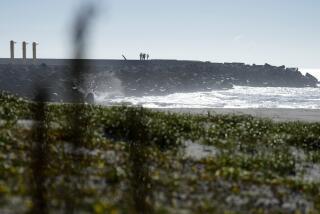Japan Defends Plutonium Venture : Nuclear power: Official dismisses fears that the project is unsafe. He says material won’t be diverted to weapons.
- Share via
TOKYO — Despite widespread international concern, Japan will proceed with a plan to breed plutonium, the basic material for making nuclear bombs, in a controversial venture to fuel nuclear power plants in this energy-poor nation, a Japanese nuclear official said Monday.
In a rare appearance before foreign reporters, Takao Ishiwatari, president of the public Power Reactor and Nuclear Fuel Development Corp., defended the plan to build plutonium-based “fast-breeder reactors” against what he called “misleading international reports” that Japan’s project is unsafe and unnecessary.
Conventional nuclear power plants use uranium, which must be enriched through a complicated, expensive process before it can be converted to weapons-grade material. But the fast-breeder reactors envisioned by Japan would use plutonium, which can be diverted for use in nuclear weapons, raising fears of international trafficking in plutonium and potential nuclear proliferation.
A prototype facility to reprocess spent nuclear fuels for the reactors was completed in Aomori prefecture in northern Japan last May.
The first shipload of slightly less than one ton of plutonium is due to depart from France this fall.
The United States military, which had provided an unofficial escort for a 1986 shipment of 180 kilograms of plutonium, will not be directly involved in protecting the ship that leaves France this fall, Ishiwatari said, although intelligence agencies may pass along any relevant satellite information.
The Japanese government will take full responsibility for the shipment’s safety, Ishiwatari said.
Ishiwatari stressed that Japan has completely opened its facilities to inspection by the International Atomic Energy Agency. In 1990, he said, 1,777 IAEA inspectors visited Japanese nuclear facilities--an average of seven per day.
“This ensures that there is no questionable or illegal transfer of nuclear materials,” said Ishiwatari, whose government-funded agency was charged in 1967 with developing the plutonium-burning reactor.
Ishiwatari said Japan’s aim is to reduce dependence on oil, gas and other non-renewable fossil fuels. He also said that Japan, which has 2% of the world’s population but will consume 20% of the world’s uranium by the year 2000, has an “international obligation” to diversify its energy sources.
As the price of uranium has dropped sharply over recent years, several nations, including the United States, have scrapped plans to develop facilities that burn the far more expensive plutonium. But Ishiwatari said Japan’s long-term strategy dictated pursuing the plutonium alternative.
“Japanese have a difficult time thinking that what is cheap now and stable in supply now will always be cheap in the future,” he said. For a nation that imports nearly all of its energy, “it is very natural to think that anything that can be used as an energy source, we should go ahead and use it,” he said.
Some critics have even raised the concern that Japan--the only nation ever to have suffered atomic attack--might begin stockpiling plutonium as one step down the road to building a nuclear-weapons capability. One study by the Massachusetts Institute of Technology estimated that by the year 2010, Japan will have stockpiled more than twice the amount of plutonium needed to run its reactors.
But Ishiwatari disagreed with the report, saying Japan will consume as much plutonium as it produces and imports. The agency anticipates demand at 80 to 90 tons and supply at 85 tons.
He also said that Japanese plans for fast-breeder reactors are also evolving. Initially, the reactors were envisioned as “breeding” plutonium, or producing more plutonium than is consumed during the fission reaction. However, the agency is now looking into the idea of reversing the process.
Ishiwatari said that while at the moment it appears that the world has an oversupply of plutonium--the result of nuclear plant wastes and the potential dismantling of atomic weapons--plutonium will remain a rare commodity in the long term.
“Right now I think plutonium is in excess, but I also stress that it won’t be in excess forever,” he said.
Japan would in theory be interested in purchasing plutonium from dismantled nuclear warheads in the former Soviet Union or the United States, Ishiwatari said, but as yet has no specific plans to do so.
Ishiwatari rejected out of hand any suggestions that Japan is headed down the nuclear weapons path. “There will be no chance, none whatsoever, permanently, that Japan will arm itself with nuclear weapons,” he said.
More to Read
Sign up for Essential California
The most important California stories and recommendations in your inbox every morning.
You may occasionally receive promotional content from the Los Angeles Times.














